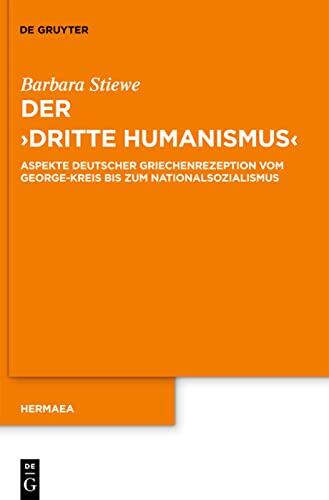
Der ""Dritte Humanismus"": Aspekte deutscher Griechenrezeption vom George-Kreis bis zum Nationalsozialismus
door
Barbara Stiewe
Nog geen beoordelingen
History
Formaat
Hardcover
Pagina's
338
Taal
Duits
Gepubliceerd
Apr 19, 2011
Uitgever
De Gruyter
Editie
1
ISBN-10
3110235617
ISBN-13
9783110235616
Beschrijving
In this insightful examination, the author delves into the multifaceted relationship between German culture and Greek antiquity, tracing the influence of classical thought from the George Circle through the tumultuous period of National Socialism. The exploration highlights how these classical ideals were reinterpreted and recontextualized by various intellectuals, showcasing the complex interplay between nationalism and humanism.
Through meticulous research, the work reveals how figures within the George Circle embraced Greek culture as a means to foster a distinct national identity, drawing upon classical themes to articulate their vision for Germany’s future. Stiewe highlights the challenges and transformations within this movement as societal and political landscapes shifted, particularly during the rise of the Nazi regime, which sought to appropriate these ideals for its own agenda.
The narrative uncovers the tensions inherent in the reception of Greek thought, particularly how its philosophical underpinnings were used to both unite and divide. By examining the nuances of this period, the author sheds light on the significant impact of Greek literature, philosophy, and aesthetics on German thought.
Finally, the book serves as a crucial reflection on how cultural heritage can be reshaped by prevailing ideologies, urging readers to consider the implications of such transformations in the context of modern interpretations of humanism and national identity.
Through meticulous research, the work reveals how figures within the George Circle embraced Greek culture as a means to foster a distinct national identity, drawing upon classical themes to articulate their vision for Germany’s future. Stiewe highlights the challenges and transformations within this movement as societal and political landscapes shifted, particularly during the rise of the Nazi regime, which sought to appropriate these ideals for its own agenda.
The narrative uncovers the tensions inherent in the reception of Greek thought, particularly how its philosophical underpinnings were used to both unite and divide. By examining the nuances of this period, the author sheds light on the significant impact of Greek literature, philosophy, and aesthetics on German thought.
Finally, the book serves as a crucial reflection on how cultural heritage can be reshaped by prevailing ideologies, urging readers to consider the implications of such transformations in the context of modern interpretations of humanism and national identity.
Recensies
Nog geen beoordelingen
Wees de eerste om dit boek te recenseren en deel je gedachten
Voeg Eerste Recensie ToeLeeslogboek
Geen leeslogboeken gevonden
Begin met het volgen van je leesvoortgang om logboeken hier te zien
Voeg je eerste leeslogboek toeNotities
Geen notities gevonden
Begin met het toevoegen van notities om ze hier te zien
Voeg je eerste notitie toeTransactielogboek
Geen transactielogboeken gevonden
Begin met het volgen van je boektransacties om logboeken hier te zien
Voeg je eerste transactielogboek toe